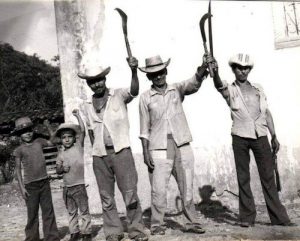
Revolutionary History: Agriculture and Social Organization — Communist Solidarity, Work and Ideology Must Be Primary
EL SALVADOR — During the 1980s, we farmworkers and urban workers, organized into guerrilla groups. Initially we had ideological training on how to produce and distribute what was needed collectively. From each one according to their efforts and to each one according to their need.
At the beginning of the civil war, there were liberated areas controlled by the FMLN guerrillas. Production collectives there produced corn, beans, panela candy, clothing, footwear, ammunition, and health care. There was no money exchanged in this production.
There was also a team in charge of doing ideological work. During the mornings, they invited groups of farmworkers (women and men) to join in the production. They worked in the fields, cultivating plots of land. In the afternoon, they held evaluation meetings and reported on how their work had gone. Everyone contributed and said whether everything had gone well, or if there were criticisms or self-criticisms.
The collectives that produced corn began the work, cleaned it, cultivated it, and when they harvested, they kept it secure among the population. They distributed it and when there was a need, they would bring it. Because often when they hid the corn, the government army found it, threw it away or burned it. It was better to leave it in peoples’ homes. So, these collectives guaranteed that food.
There was a group that produced panela cane sugar as a portable food resource. When there was a battle or when some guerrilla fighters departed, they gave this to them as the basic source of energy.
There was a healthcare collective in charge of medicine and caring for the wounded. They already had connections to get medicine from the cities or from other countries.
Another collective was the mission group. It made sure that the comrades who went into combat had everything they needed, such as shoes, clothes, caps, socks.
All this was at the beginning of the war. Everything was with the goal of a change in the system. All these collectives were responsible for recruiting the masses. But when the war got more intense from 1983 onwards, these groups changed their logistics and health strategies.
The Collectivization of Agriculture: 1983 and After
Starting in 1983, the war was already more acute militarily. Some groups of elderly men and women who helped us in production went to refugee centers in Honduras and Nicaragua. Children who worked full-time in the camps in the agricultural production area mobilized to prepare militarily.
A collective formed to take charge of food logistics, solving problems together with the population of other towns. Some areas received fertilizers to plant beans and corn. The guerrillas were already more numerous. They came from other places and concentrated in one place. You had to have everything they needed. Then you bought it or shared it with the civilian population of the area.
A collective had also formed for weapons preparation. They took charge of getting the materials. They looked for carpenters who could make us the material needed for grenades.
At the end of each day, all these collectives evaluated and commented on the problems that they had had. They discussed the problems to solve them. If someone had a problem they were criticized, but constructively, not destructively.
When the FMLN leaders demobilized us in 1992, we wanted to continue working under these collectives. Vegetables were produced for the Peace Accords, and when they were harvested, they were distributed among all. You always worked and shared collectively. The vegetables were sent to the warehouse, and someone was in charge of distributing them.
Later the leadership of the FMLN put aside that ideology of communist solidarity. They prioritized elections and not political training. When we saw this, many combatants were disappointed and stopped believing in the FMLN election project. Today many of us are part of the International Communist Workers’ Party, because here we have found the communist roots of our original training.
Previous articles:
Farm workers and Ex-combatants of the Civil War in El Salvador Contribute to ICWP’s Revolutionary Struggle Red Flag, vol. 9 #17 Dec 2018

